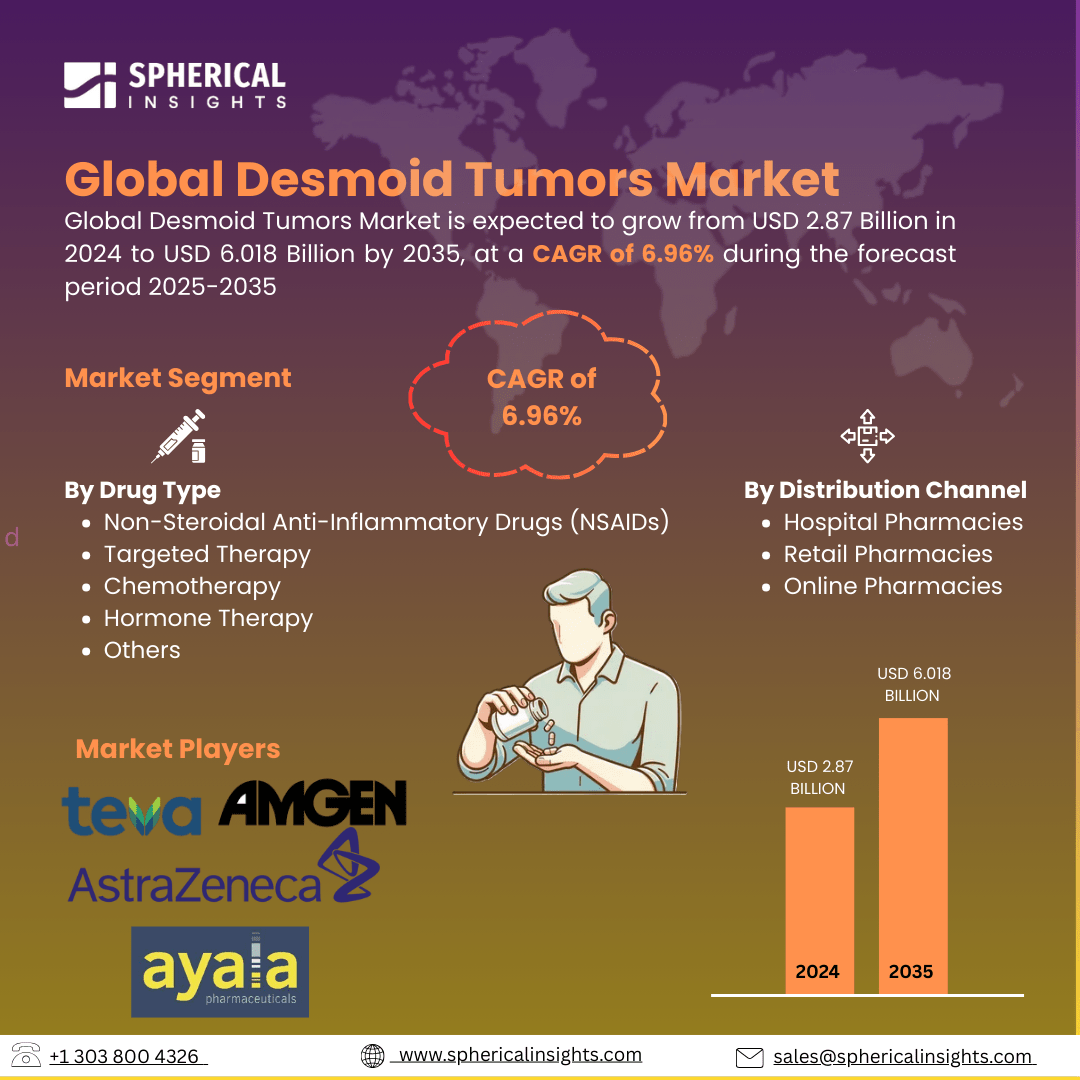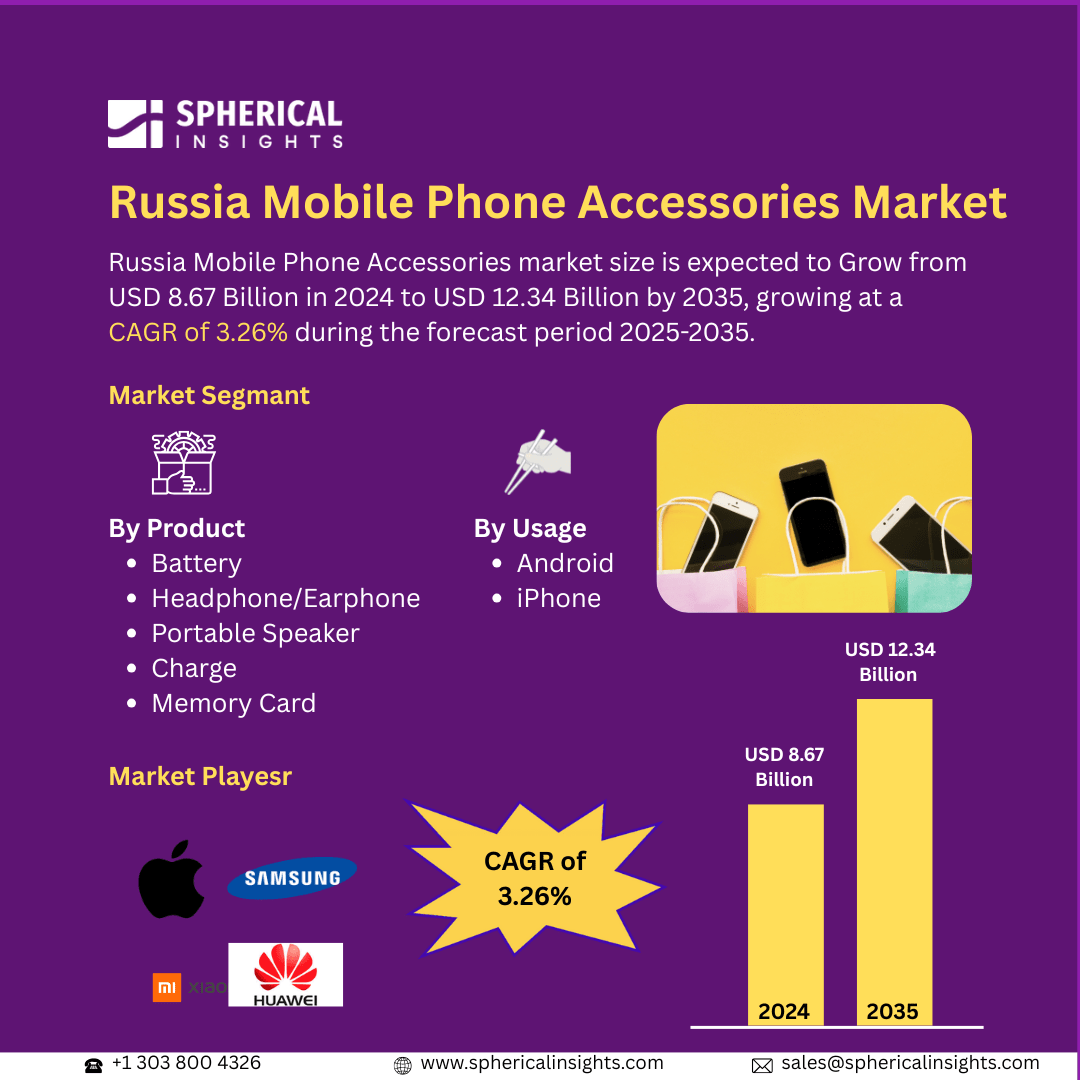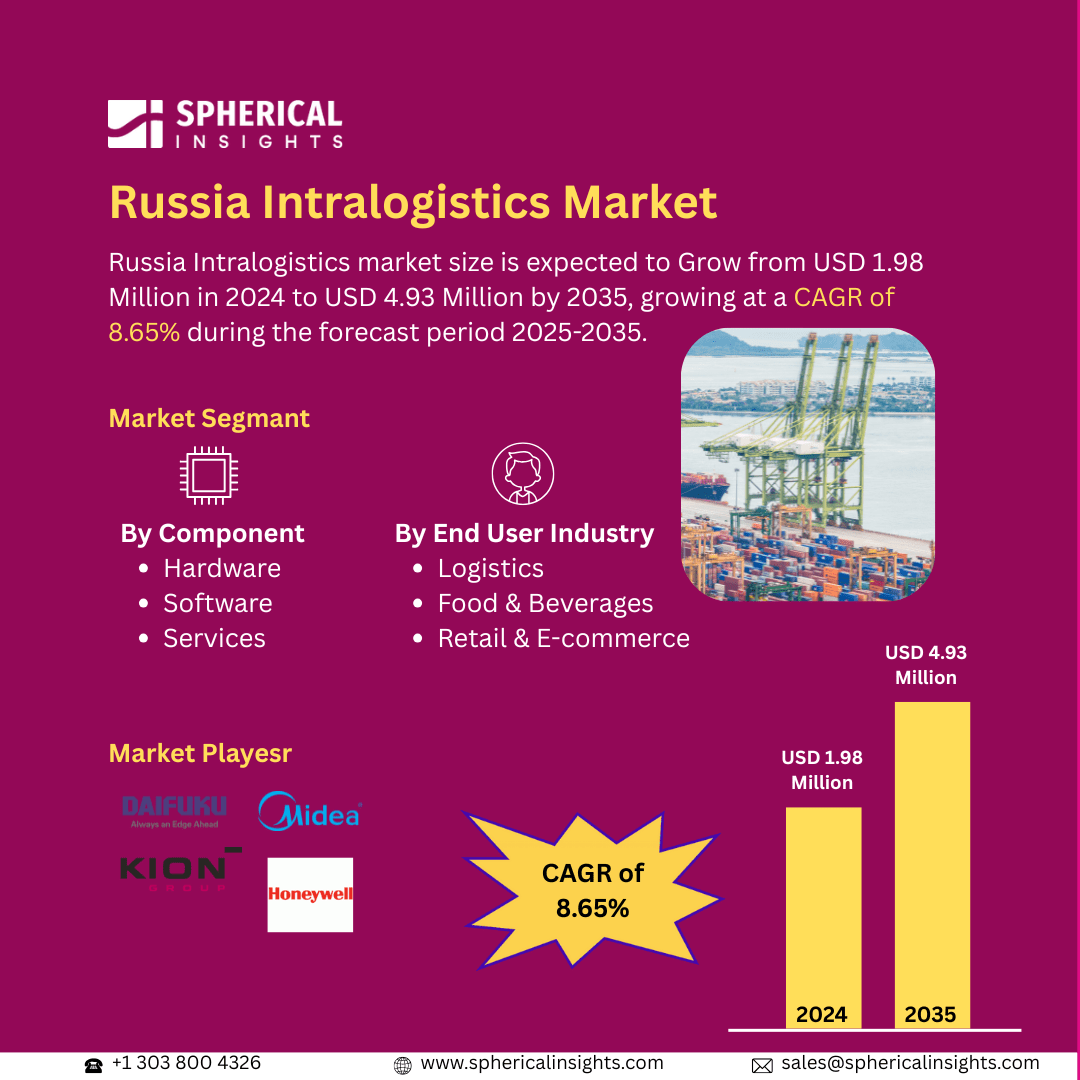- As per Spherical Insights & Consulting, the Global Desmoid Tumors Market Size is expected to grow from USD 2.87 Billion in 2024 to USD 6.018 Billion by 2035, at a CAGR of 6.96% during the forecast period 2025-2035, owing to the launch of new therapies in the market and the rise in the number of cases
- The leading Desmoid Tumors Market Companies such as AFT Pharmaceuticals, Amgen, AstraZeneca, Ayala Pharmaceuticals, Bayer, Debiopharm, F. Hoffmann-La Roche, Novartis, Pfizer, SpringWorks Therapeutics, Stryker, Abbott Laboratories, Amneal Pharma, Horizon Therapeutics, and Others.
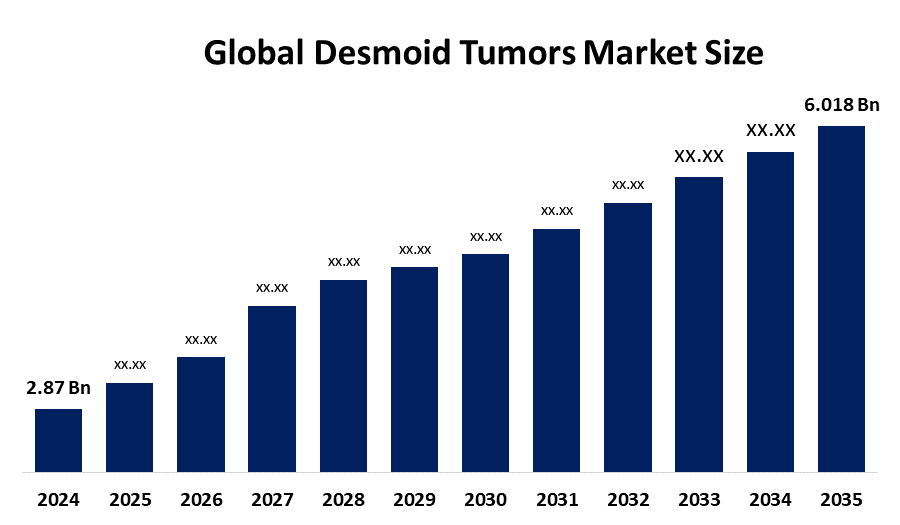
Desmoid Tumors Treatment Market: Understanding and Treatment Algorithm:
Desmoid tumors are rare, non-cancerous soft tissue growths that arise from connective tissue. Though benign, they can be aggressive, invading nearby tissues and organs. They often cause pain, swelling, or functional impairment. Treatment includes surgery, radiation, or targeted therapies, depending on tumor location, size, and progression. Recurrence is common.
Desmoid Tumors Diagnosis:
Diagnosis of desmoid tumors involves imaging techniques like MRI or CT scans to assess size and location, followed by a biopsy to confirm the diagnosis through histopathological analysis. Genetic testing may detect mutations, such as in the CTNNB1 or APC genes. Early and accurate diagnosis is crucial for effective treatment planning.
Desmoid Tumors Treatment
Treatment of desmoid tumors depends on tumor size, location, and symptoms. Options include active surveillance for stable cases, surgery for accessible tumors, and medications like NSAIDs, hormonal therapy, or targeted drugs such as sorafenib or tocilizumab. Radiation therapy may be used when surgery isn’t feasible or for recurrent tumors.
Desmoid Tumors Epidemiology
The disease epidemiology covered in the report provides historical as well as forecasted epidemiology segmented by Total Diagnosed Incident Population of Desmoid Tumors, Gender-specific Diagnosed Incidence of Desmoid Tumors, Type-specific Diagnosed Incidence of Desmoid Tumors, Age-specific Diagnosed Incidence of Desmoid Tumors, Diagnosed Incident Population based on Primary Site of Desmoid Tumors, and Diagnosed Incident Population based on Histologic Classification of Desmoid Tumors Tumour in the global market covering North America, Europe, Asia-Pacific, Latin America, the Middle East, and Africa from 2024 to 2035.
Principal Insights
This section offers a global overview of desmoid tumors epidemiology in major markets worldwide.
Country Wise- Desmoid Tumors Multiforme Epidemiology
- The epidemiology segment provides Desmoid Tumors prevalence data and findings across key regions worldwide, including North America, Europe (Germany, France, Italy, Spain, and the United Kingdom), Asia-Pacific (including Japan), Latin America, the Middle East, and Africa.
Desmoid Tumors: Recent Developments:
- In June 2025, SpringWorks Therapeutics announced a positive CHMP opinion for nirogacestat, marking a key regulatory milestone in Europe. The recommendation followed compelling Phase III DeFi trial outcomes, a 71% reduction in disease progression and notable quality-of-life improvements, positioning nirogacestat as the first potential EU-approved therapy for progressing desmoid tumors.
Desmoid Tumors Marketed Drugs:
- Ogsiveo (nirogacestat): SpringWorks Therapeutics
Ogsiveo is an oral gamma-secretase inhibitor designed to treat adults with progressing desmoid tumors. It works by blocking the Notch signaling pathway, which is involved in tumor growth. Ogsiveo received FDA approval as the first systemic therapy specifically for desmoid tumors, showing significant reduction in tumor progression and improved quality of life.
- AL102: Ayala Pharmaceuticals/Immunome
AL102 is an oral gamma-secretase inhibitor targeting the Notch signaling pathway to inhibit tumor growth in desmoid tumors. It has received FDA orphan drug designation and is currently in Phase II/III clinical trials, showing promising response rates with manageable side effects.
Sorafenib is a multi-kinase inhibitor that blocks tumor cell proliferation and angiogenesis. Though originally approved for cancers like liver and kidney cancer, it has been used off-label in desmoid tumors, demonstrating tumor shrinkage and symptom improvement in some patients.
Desmoid Tumors: Emerging Therapies
- AL102: It is an oral gamma-secretase inhibitor in late-stage clinical trials for desmoid tumors. It targets the Notch signaling pathway to block tumor growth and progression, offering a promising treatment option for patients with progressing or refractory disease.
- Tegavivint: It is a small-molecule Wnt pathway inhibitor under investigation for desmoid tumors. It disrupts tumor cell survival signaling and is being studied for its potential to reduce tumor size and improve patient outcomes in resistant cases.
- Nirogacestat: It is an oral gamma-secretase inhibitor recently approved for progressing desmoid tumors. It modulates the Notch pathway to reduce tumor growth and improve quality of life, representing the first FDA-approved systemic treatment for this rare tumor.
- IPN60130: It is a novel small-molecule inhibitor targeting Wnt/β-catenin signaling, crucial in desmoid tumor development. It is in early clinical trials aiming to halt tumor progression by disrupting this pathway.
Desmoid Tumors Market Outlook
- The desmoid tumors market comprises the development, manufacturing, and sale of therapies targeting rare, benign but aggressive soft tissue tumors called desmoid tumors. These tumors invade nearby tissues, causing pain and dysfunction, with treatment options including surgery, radiation, and emerging targeted drug therapies.
- Key drivers of the desmoid tumors market include increasing awareness and diagnosis, rising prevalence among aging populations, advancements in targeted therapies like gamma-secretase inhibitors, supportive regulatory approvals, and growing investments in research. These factors collectively boost demand for effective, less invasive treatment options worldwide.
- Opportunities in the market arise from unmet medical needs, the development of novel targeted therapies, expansion into emerging markets, growing clinical trial activities, and potential collaborations between biotech and pharmaceutical companies. Advances in personalized medicine also offer promising avenues for improved treatment outcomes.
- Governments worldwide have launched initiatives supporting rare disease research, including desmoid tumors. These include funding programs, national rare disease policies, patient assistance, and promoting clinical trials to improve diagnosis, treatment access, and innovation globally.
- Market challenges include limited disease awareness, high treatment costs, diagnostic delays, and the rarity of desmoid tumors, which hinder large-scale clinical trials and drug development.
- Market growth is projected due to targeted therapy advancements, improved diagnosis rates, recent regulatory approvals, and strengthened industry collaborations, accelerating treatment development.
Desmoid Tumors Market Segmentation
By Drug Type:
- Non-Steroidal Anti-Inflammatory Drugs (NSAIDs)
- Targeted Therapy
- Chemotherapy
- Hormone Therapy
- Others
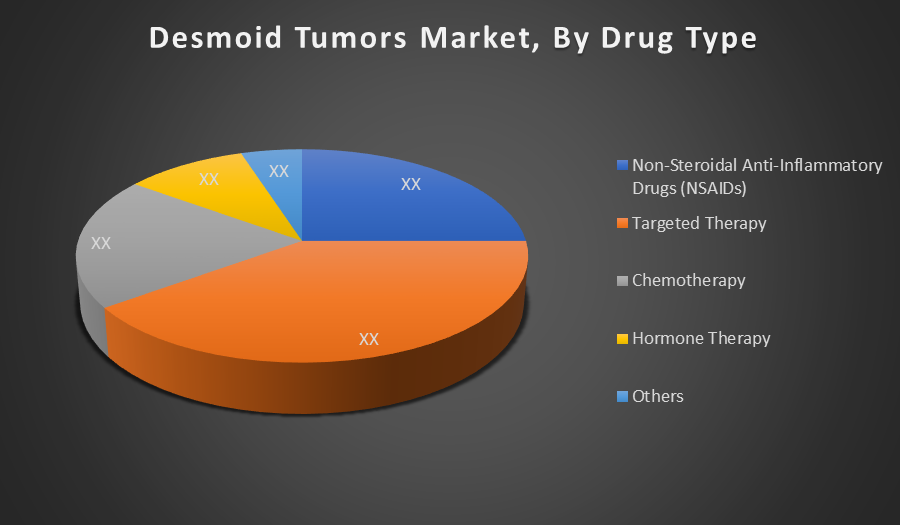
The Targeted Therapy segment holds the largest market share in the global desmoid tumors market due to its higher efficacy and specificity in inhibiting tumor growth pathways, such as Notch and Wnt signaling. Advances in drugs like gamma-secretase inhibitors have improved outcomes, driving preference over traditional NSAIDs and chemotherapy.
By Distribution Channel:
- Hospital Pharmacies
- Retail Pharmacies
- Online Pharmacies
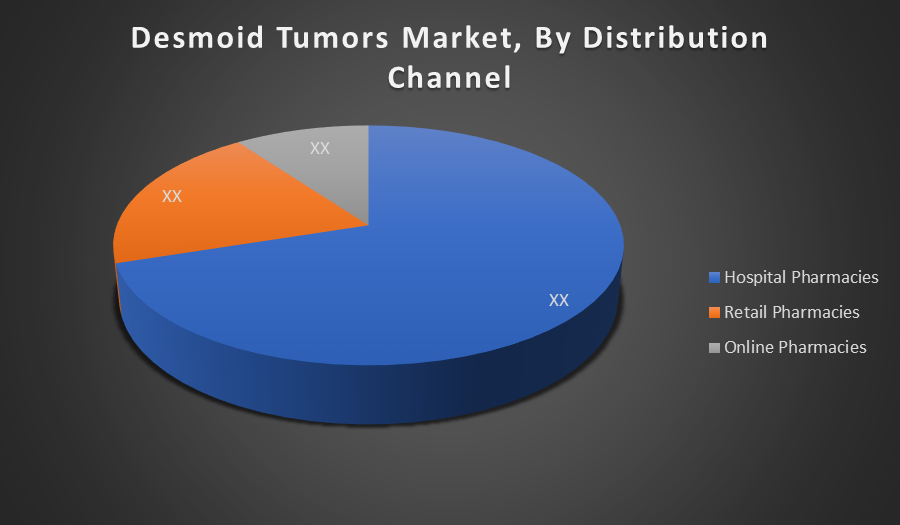
The Hospital Pharmacies segment dominates the desmoid tumors market by distribution channel, as hospitals provide specialized care and access to advanced therapies. Patients with complex or rare conditions like desmoid tumors often receive treatment and medications directly through hospital settings, ensuring proper administration and monitoring by healthcare professionals.
Regional Segment Analysis of the Desmoid Tumors Market
North America holds the largest share of the global desmoid tumors market. This is due to its advanced healthcare infrastructure, high healthcare spending, strong presence of pharmaceutical companies, favourable reimbursement policies, and active participation in clinical trials. These factors enable early diagnosis, access to innovative therapies, and robust research and development activities, sustaining market leadership. Additionally, patient advocacy groups and comprehensive insurance coverage further enhance treatment accessibility and awareness across the region.
Asia-Pacific is the fastest-growing region in the desmoid tumors market. Growth is driven by improving healthcare infrastructure, expanding patient populations, rising disposable incomes, and increasing government support for rare diseases. Additionally, growing awareness, collaborations between pharmaceutical companies and research institutions, and the expansion of specialized treatment centers contribute to rapid market expansion in this region. Urbanization and increased health insurance penetration also improve access to advanced treatments, fueling sustained growth in Asia-Pacific.
Desmoid Tumors Market Key Companies
- AFT Pharmaceuticals
- Amgen
- AstraZeneca
- Ayala Pharmaceuticals
- Bayer
- Debiopharm
- F. Hoffmann-La Roche
- Novartis
- Pfizer
- SpringWorks Therapeutics
- Stryker
- Abbott Laboratories
- Amneal Pharma
- Horizon Therapeutics
- Others
Desmoid Tumors Therapeutics Market Report Scope
- The Desmoid Tumors therapeutics market report provides a detailed overview, covering its causes, symptoms, disease progression, and existing treatment options.
- Detailed insights into Desmoid Tumors’ epidemiology and therapeutic approaches are included.
- Additionally, a comprehensive review of existing and emerging Desmoid Tumors therapies is provided, including an evaluation of new treatments expected to influence the current Desmoid Tumors treatment market landscape.
- The report includes a detailed review of the Desmoid Tumors therapeutics market, both historical and forecasted, highlighting the global drug reach.
- The Patient-Based Desmoid Tumors Market Forecasting report offers valuable insights into trends shaping the global Desmoid Tumors market, helping to develop effective business strategies.
Desmoid Tumors Treatment Market Report Insights
- Forecasting Market Trends Based on Patient Data and Disease Rates
- Desmoid Tumors Therapeutic Approaches in Desmoid Tumors
- Review Of Drugs in Development for Desmoid Tumors
- Market, Growth, and Trends in Desmoid Tumors
- Market Opportunities in Desmoid Tumors Treatment
- Effects Of Future Therapies on Desmoid Tumors Treatment.
Desmoid Tumors Treatment Market Report Key Strengths
- 15 Years Desmoid Tumors Market Forecast
- Global Coverage
- Desmoid Tumors Epidemiology Segmentation
- Key Cross Competition
Desmoid Tumors Treatment Market Report Assessment
- Present Practices in the Desmoid Tumors Treatment Market
- Review of Investigational Desmoid Tumors Drugs
- Attractiveness of the Desmoid Tumors Drug Market
- Desmoid Tumors Market Drivers
- Desmoid Tumors Market Barriers
- SWOT
- Attribute Analysis
Market Segment
This study forecasts revenue at the global, regional, and country levels from 2020 to 2035. Spherical Insights has segmented the desmoid tumors market based on the below-mentioned segments:
Global Desmoid Tumors Market, By Drug Type
- Non-Steroidal Anti-Inflammatory Drugs (NSAIDs)
- Targeted Therapy
- Chemotherapy
- Hormone Therapy
- Others
Global Desmoid
Tumors Market, By Distribution Channel
- Hospital Pharmacies
- Retail Pharmacies
- Online Pharmacies
Global Desmoid Tumors Market, By Regional Analysis
- North America
- Europe
- Germany
- UK
- France
- Italy
- Spain
- Russia
- Rest of Europe
- Asia Pacific
- China
- Japan
- India
- South Korea
- Australia
- Rest of Asia Pacific
- South America
- Brazil
- Argentina
- Rest of South America
- Middle East & Africa
- UAE
- Saudi Arabia
- Qatar
- South Africa
- Rest of the Middle East & Africa
